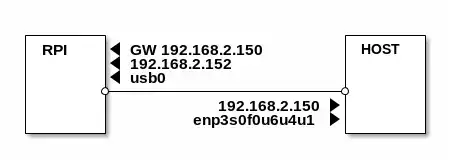I'm following this tutorial for converting RPI to usb gadget. I've modified setup script a little to fit my needs:
err_file=$HOME/usb_setup_err
echo "Time: $(date -Ins)" >> $err_file
echo 'Running setup script' >> $err_file
{
##= Create usb gadget
cd /sys/kernel/config/usb_gadget/
mkdir -p hax_usb
cd hax_usb
##= Provide gadget configuration info
echo 0x1d6b > idVendor
echo 0x0104 > idProduct
echo 0x0100 > bcdDevice
echo 0x0200 > bcdUSB
mkdir -p strings/0x409
echo "fedcba9876543210" > strings/0x409/serialnumber
echo "Tobias Girstmair" > strings/0x409/manufacturer
echo "iSticktoit.net USB Device" > strings/0x409/product
##= Create gadget functions
mkdir -p functions/ecm.usb0
mkdir -p functions/hid.usb0
##== Describe emc function
echo "48:6f:73:74:50:43" > functions/ecm.usb0/host_addr
echo "42:61:64:55:53:42" > functions/ecm.usb0/dev_addr
echo 'Created ethernet functions'
##== Descrive hid function
echo 1 > functions/hid.usb0/protocol
echo 1 > functions/hid.usb0/subclass
echo 8 > functions/hid.usb0/report_length
echo -ne \\x05\\x01\\x09\\x06\\xa1\\x01\\x05\\x07\\x19\\xe0\\x29\\xe7\\x15\\x00\\x25\\x
01\\x75\\x01\\x95\\x08\\x81\\x02\\x95\\x01\\x75\\x08\\x81\\x03\\x95\\x05\\x75\\x01\\x05
\\x08\\x19\\x01\\x29\\x05\\x91\\x02\\x95\\x01\\x75\\x03\\x91\\x03\\x95\\x06\\x75\\x08\\
x15\\x00\\x25\\x65\\x05\\x07\\x19\\x00\\x29\\x65\\x81\\x00\\xc0 > functions/hid.usb0/re
port_desc
echo 'Created USB HID function'
##= Create gadget configuration
mkdir -p configs/c.1/strings/0x409
echo "Config 1: ECM network" > configs/c.1/strings/0x409/configuration
echo 250 > configs/c.1/MaxPower
echo 'Creating configuration'
##== Add functions to gadget configuration
ln -s functions/ecm.usb0 configs/c.1/
ln -s functions/hid.usb0 configs/c.1/
echo 'Added functions'
ls /sys/class/udc > UDC
ifconfig usb0 192.168.2.152 netmask 255.255.255.0 up
route add -net default gw 192.168.2.150
ifconfig -a
route -n
ls /dev | grep hid
echo 'Done'
} >> $err_file 2>&1
Script works correctly for the most part (usb interface is created, ip address and gateway assigned), but avahi does not see my raspberry when connected to the pc. My network setup looks like this:

Host pc interface:
enp3s0f0u6u4u1: flags=4163<UP,BROADCAST,RUNNING,MULTICAST> mtu 1500
inet 192.168.2.150 netmask 255.255.255.0 broadcast 192.168.2.255
inet6 fe80::7dfe:77a0:ed21:f67c prefixlen 64 scopeid 0x20<link>
ether 48:6f:73:74:50:43 txqueuelen 1000 (Ethernet)
RX packets 458 bytes 35426 (34.5 KiB)
RX errors 0 dropped 0 overruns 0 frame 0
TX packets 85 bytes 18024 (17.6 KiB)
TX errors 0 dropped 0 overruns 0 carrier 0 collisions 0
Raspberry pi interface:
usb0: flags=4099<UP,BROADCAST,MULTICAST> mtu 1500
inet 192.168.2.152 netmask 255.255.255.0 broadcast 192.168.2.255
ether 42:61:64:55:53:42 txqueuelen 1000 (Ethernet)
RX packets 0 bytes 0 (0.0 B)
RX errors 0 dropped 0 overruns 0 frame 0
TX packets 0 bytes 0 (0.0 B)
TX errors 0 dropped 0 overruns 0 carrier 0 collisions 0
Raspberry pi routing table:
Destination Gateway Genmask Flags Metric Ref Use Iface
0.0.0.0 192.168.2.150 0.0.0.0 UG 0 0 0 usb0
192.168.2.0 0.0.0.0 255.255.255.0 U 0 0 0 usb0
Tutorial checklist:
- [X] Added setup script to
rc.local - [X] Added required modules to
/etc/modules - [X] Added
dtoverlay=dwc2to/boot/config.txt
Other info:
- For raspberry I'm using
2019-04-08-raspbian-stretch-full - On desktop I'm using Gentoo Linux
- No networking configuration other than in script were performed on the RPI
- When using
avahi-browse(I useavahi-browse -atr) I can seeenp3s0f0u6u4u1. - Pinging RPI results in 100% packet loss but no errors.
- I cannot ssh to the rpi (
ssh pi@192.168.2.152) - it gives me error:ssh: connect to host 192.168.2.152 port 22: No route to host - Restarting interface on the host (
sudo ifconfig enp3s0f0u6u4u1 downandsudo ifconfig enp3s0f0u6u4u1 up) didn't result in anything. - All logs files can be viewed here
- I've already tried using
g_ether- it works but does not fit my needs (I need to have Ethernet and usb hid at the same time `g_ether -- does not allow it). - I've omitted
rpi-updatefrom tutorial because it was necessary only for old kernel (pre-4.4)